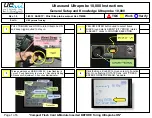
23
6 Setup
VEGAWAVE 62 • Two-wire 8/16 mA
32255-EN-181126
The correctness of the subsequent switching conditions on the indi-
cations of the SPLC must be monitored. The sensor must neither be
dismounted nor triggered by filling the vessel.
You can carry out the function test with the output current values also
directly via a safety PLC or a process control system.
4 Pushing the test key on the signal conditioning instrument
A test key is lowered in the front plate of the signal conditioning instru-
ment. Push the test key for > 2 seconds with a suitable object. Hence
a test is started. Hence the correctness of the subsequent switching
conditions must be monitored via the two LEDs on the signal condi-
tioning instrument as well as the connected facilities. The sensor must
neither be dismounted, nor controlled by filling the vessel.
This test is valid if you cannot change the vessel filling or cannot
dismount the sensor.
The proof test according to IEC 61508 can be carried out by pushing
the test key on a respective signal conditioning instrument or briefly
(> 2 seconds) interrupting the supply line to the sensor.
The correctness of the subsequent switching conditions must be
monitored via the two LEDs on the signal conditioning instrument as
well as the connected devices. The sensor must neither be dismount-
ed nor triggered by filling the vessel.
This applies for VEGAWAVE 62 with two-wire electronics module
WE60Z.
You can carry out the function test with the output current values also
directly via a safety PLC or a process control system.
A function test can be carried out with measurement setups in con-
junction with the two-wire electronics module WE60Z EX.
If you are using a signal conditioning instrument of type VEGATOR for
this purpose, you can carry out the test with the integrated test key.
The test key is recessed in the front plate of the signal conditioning
insturment. Push the test key for > 2 seconds with a suitable object
(screwdriver, pen, etc.).
When the VEGAWAVE 62 is connected to a processing system or an
SPLC, you have to interrupt the connection cable to the sensor for > 2
seconds. The switching delay must be set to 0.5 s.
After releasing the test key or interrupting the connection cable to the
sensor, the complete measuring system can be checked on correct
function. The following operating conditions are simulated during the
test:
•
Fault message
•
Empty signal
•
Full signal
Test without filling or
dismounting the sensor
(3, 4)
















































